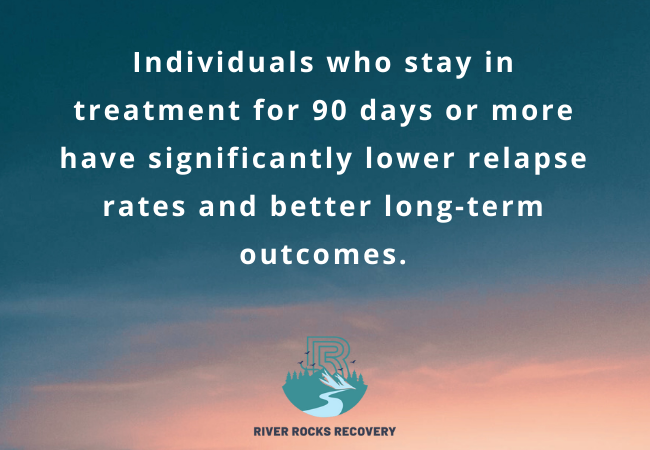Alcohol addiction affects people differently, which means the recovery process also varies from person to person. One of the most common questions asked by those considering treatment is: How long does alcohol rehab take? While there is no one-size-fits-all answer, understanding the average timelines and what happens during each stage can help individuals and families feel more prepared and hopeful.
At River Rocks Recovery in Middletown, Ohio, we know that the journey to sobriety is unique to each individual. This guide explores the typical duration of alcohol rehab programs, what factors influence the length of treatment, and how long-term recovery success depends on more than just time spent in rehab.
The Timeline of Alcohol Rehab: An Overview
Rehab for alcohol addiction typically progresses through stages, beginning with detoxification and transitioning into varying levels of care based on the individual’s needs. The duration of each phase can depend on several factors including the severity of the addiction, mental health concerns, and a person’s physical health.
On average, alcohol rehab programs fall into the following timeframes:
-
Detox: 5–10 days
-
Residential/Inpatient Rehab: 30, 60, or 90 days
-
Partial Hospitalization Program (PHP): 2–6 weeks
-
Intensive Outpatient Program (IOP): 8–12 weeks
-
Outpatient Care: Several weeks to months or longer
Let’s break down each phase and how it contributes to recovery.
Medical Detox: The First Critical Step
Before anyone can engage in a comprehensive treatment plan, their body must first be cleared of alcohol. This is the role of detox. Depending on the severity of alcohol dependence, medical detox can take anywhere from a few days to a full week or more. Withdrawal symptoms like shaking, sweating, anxiety, and even seizures can occur, so it’s vital that detox be supervised by medical professionals.
Although detox is necessary, it’s not a standalone solution. It’s the entry point that clears the way for deeper psychological and emotional healing.
Inpatient Alcohol Rehab: Structure and Support
For many, the next step after detox is a residential or inpatient program. These programs provide round-the-clock care, a structured environment, and a safe space free from alcohol and outside triggers. Inpatient rehab can range from 30 to 90 days depending on an individual’s progress and specific needs.
During this time, individuals participate in daily therapy sessions, both individual and group-based, along with educational programming and skill-building workshops. It’s also during this stage that co-occurring disorders are often identified and addressed—such as depression, anxiety, or PTSD.
One of the most immersive forms of an Addiction Treatment Program in Middletown, Ohio, inpatient rehab provides a foundation for lasting sobriety by helping clients examine the roots of their addiction and learn how to build a life without alcohol.
Transitioning to PHP: Continued Care with Flexibility
After inpatient treatment, many people benefit from stepping down into a Partial Hospitalization Program in Middletown, Ohio. This level of care still offers daily therapeutic support but allows individuals to return home in the evenings. PHPs typically run five days a week for several hours a day and may last two to six weeks.
PHP serves as a critical bridge between inpatient care and outpatient life, giving clients the opportunity to apply what they’ve learned in real-world settings while still receiving intensive support. This phase focuses heavily on relapse prevention strategies, mental health management, and rebuilding healthy routines.
Intensive Outpatient Programs: Balancing Life and Recovery
An Intensive Outpatient Program in Middletown, Ohio provides another step-down level of care for those who have either completed PHP or don’t require the structure of inpatient rehab. IOPs are generally held three to five days per week, offering group and individual counseling sessions during daytime or evening hours to accommodate work or family responsibilities.
This phase usually lasts 8 to 12 weeks, depending on the person’s progress. It’s ideal for people who are stable in their recovery but still benefit from regular accountability, community support, and therapeutic services.
This program is especially effective for individuals with strong home support systems who are committed to maintaining sobriety while re-engaging with day-to-day life.

Outpatient Treatment: Ongoing Recovery Support
After completing IOP, individuals may continue in an Outpatient Treatment Program in Middletown, Ohio for added stability. Outpatient rehab typically includes weekly therapy sessions and continued engagement with peer support groups or alumni programs.
This stage is highly flexible and often lasts several months or longer. The goal of outpatient care is to ensure clients continue progressing toward independence while having access to resources and professional guidance.
This phase supports sustained sobriety through gradual transition and long-term coping strategies.
What Determines the Length of Rehab?
There are several factors that can influence how long someone stays in rehab:
-
Severity of addiction: Long-term or heavy alcohol use often requires more intensive and prolonged treatment.
-
Co-occurring disorders: The presence of mental health issues can extend treatment timelines to ensure comprehensive care.
-
Physical health: Medical complications related to alcohol use may necessitate additional care.
-
Personal readiness and engagement: Motivation and participation in therapy play a big role in the pace of progress.
-
Support system: A strong, sober support network can positively impact the duration and outcomes of treatment.
There’s no shame in needing more time—healing isn’t a race. The important thing is receiving the right level of care for as long as needed to build a stable foundation for recovery.
Why Longer Rehab Often Leads to Better Outcomes
Research has consistently shown that longer treatment stays are linked to higher success rates in maintaining long-term sobriety. This is because it takes time not only to detox physically but also to rewire behaviors, change thought patterns, and address underlying emotional or psychological issues.
Many people who complete 90-day programs or step down through multiple levels of care—such as inpatient, PHP, and IOP—report stronger outcomes, including reduced relapse rates and improved mental health.
Consistency in care allows for better skill retention, stronger support relationships, and deeper self-awareness.
Why Choose River Rocks Recovery?
Choosing a treatment center can feel overwhelming, but finding a place that offers personalized, compassionate care makes all the difference. At River Rocks Recovery, our team is dedicated to guiding you through every stage of the recovery journey—from medical detox to outpatient care and beyond.
As a trusted Addiction Treatment Center Middletown, Ohio, we provide a continuum of care tailored to your specific needs. Our clinicians, counselors, and support staff are passionate about helping you rebuild your life with dignity, respect, and evidence-based practices. We believe in healing the whole person, not just treating symptoms.
Conclusion
So, how long does alcohol rehab take? The truth is, it takes as long as you need. For some, that may be 30 days. For others, it could mean several months across multiple levels of care. What matters most is not the speed of your recovery but the strength of your foundation.
Whether you’re just starting your journey or looking to return after a setback, River Rocks Recovery is here to support you every step of the way. We offer compassionate and comprehensive Alcohol Rehab Treatment in Middletown, Ohio, tailored to help you thrive.
Call us today at (888) 905-6281 to speak with a caring member of our team. Your path to recovery starts now—and we’re honored to walk it with you.
Frequently Asked Questions (FAQs)
How long does alcohol detox usually last?
Alcohol detox typically lasts between 5 to 10 days, depending on the severity of dependence, medical history, and any co-occurring health conditions. Medically supervised detox ensures a safer and more comfortable withdrawal process.
Is 30 days in rehab enough to recover from alcohol addiction?
While 30 days can provide a strong foundation for recovery, many individuals benefit from longer stays or step-down levels of care like PHP or IOP. Lasting recovery often requires a continuum of treatment and ongoing support.
What factors affect how long someone needs to stay in rehab?
Factors include the severity and duration of alcohol use, physical and mental health conditions, co-occurring disorders, engagement in treatment, and strength of the individual’s support system.
Can I keep working or going to school during alcohol rehab?
Yes, many programs offer flexible scheduling. Intensive Outpatient Programs (IOP) and Outpatient Treatment Programs allow individuals to continue work or school while receiving support several times per week.
What happens after I complete alcohol rehab?
Aftercare is a crucial part of recovery. Many individuals continue with outpatient therapy, peer support groups, or alumni programs. Ongoing accountability and connection are key to maintaining long-term sobriety.

